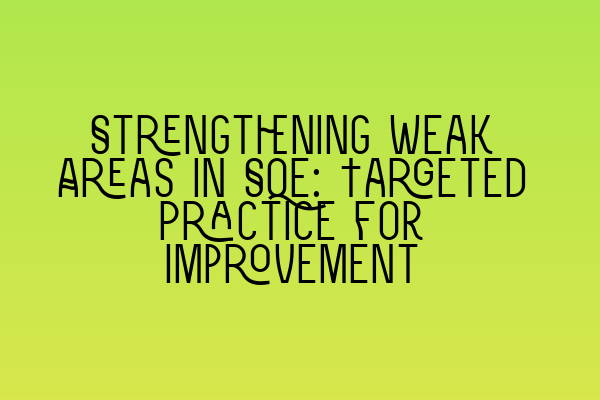Strengthening Weak Areas in SQE: Targeted Practice for Improvement
Preparing for the Solicitors Qualifying Examination (SQE) can be a daunting task. As aspiring solicitors, it is crucial to identify and strengthen weak areas to ensure success in the exam. In this article, we will discuss effective strategies and targeted practice methods that can help you improve your performance in the SQE.
1. Self-Assessment
The first step in addressing weak areas is to conduct a thorough self-assessment. Reviewing your performance in mock exams, practice questions, or previous coursework can assist in identifying patterns of weaknesses. Additionally, consider seeking feedback from mentors, study groups, or instructors to gain valuable insights into areas that require improvement. Self-assessment is a critical first step in developing a targeted study plan.
2. Targeted Study Plan
Once you have identified your weak areas, it’s time to create a focused study plan. Break down the subject matter into manageable chunks and allocate specific time for each area. Prioritize areas that carry more weight in the exam and allocate more study time accordingly. Given the comprehensive nature of the SQE, it is crucial to balance your study across all subjects while giving more attention to weaker areas.
Collaborating with a study group can be immensely beneficial at this stage. By discussing and explaining concepts to others, you not only solidify your understanding but also gain valuable insights from the perspectives of your peers. Consider joining a SQE exam study group to engage in collaborative learning and broaden your knowledge base.
3. Practicing with Past Papers
One of the most effective ways to strengthen weak areas is by practicing with past papers. Past papers provide insight into the exam format, question styles, and level of difficulty. By regularly attempting past papers, you expose yourself to a range of questions and scenarios, which helps you identify weak areas and understand the examiner’s expectations.
As you practice with past papers, pay close attention to the areas where you struggle the most. Devote additional study time to these specific topics and seek additional resources, such as textbooks or online materials, to gain a deeper understanding. Continuous practice and targeted study based on past papers are key to improving your performance in the SQE.
4. Seeking Professional Support
If you find it challenging to address weak areas on your own, consider seeking professional support. Working with a qualified solicitor trainer or tutor can provide personalized guidance and assistance in strengthening weak subject areas. They can offer specialized knowledge, explain complex concepts, and provide valuable feedback on your performance.
If you are struggling with ethical challenges and balancing legal and moral obligations, you may find the article on ethical challenges in international law helpful. It offers insights into navigating the ethical complexities of the legal profession.
Additionally, if you are interested in understanding the role of a solicitor in the UK, exploring their legal responsibilities and duties, the article on navigating solicitor’s role in the UK provides valuable insights.
5. Regular Review and Revision
Lastly, regular review and revision are essential to reinforce your understanding and retention of the subject matter. Allocate time each week to review the topics you have covered and revisit any weak areas that require additional attention. Incorporate regular revision sessions into your study plan to ensure a comprehensive and well-rounded understanding of all subjects.
Finally, if you are interested in a comparative analysis of corporate legal frameworks between Delaware and the UK, the article on Delaware vs UK provides valuable insights.
By following these strategies and engaging in targeted practice, you can strengthen your weak areas in preparation for the SQE. Remember, success in the exam is not solely determined by innate abilities but by dedicated and focused preparation. So, embrace the challenge, stay disciplined, and approach your weak areas with determination and persistence. With the right strategies and targeted practice, you can overcome any obstacles and excel in the SQE.

Leave a Reply